The Department of Health overspent its revenue budget by £207m in 2015-16. This is the clearest indication yet of the dire state of finances for the NHS. But with years of greater austerity to come, the need has never been greater to obtain financial stability to protect the quality of patient care.
The overspend was not unexpected. The deficits for NHS providers have been rising exponentially in recent years. In 2014-15 DH just managed to balance its book despite a deficit among NHS providers of £840m. But with a provider deficit of £2.5bn last year – nearly three times as large as the previous year – it was always hard to see a situation in which DH wouldn’t overspend.
The total overspend isn’t higher due to sizable savings in other areas, with large underspends from NHS England and other arm’s length bodies, and a transfer from the capital budget. A report by the National Audit Office highlights that many of last year’s savings were one-offs, alongside a fortunate excess £417m from National Insurance, without which the overspend would be even greater.
Reflections on the reasons for this outcome are of course needed, but it is crucial to get spending under control this year. Perhaps the most concerning factor of the overspend is that it has happened in a year of relative wealth for the NHS. The budget rose by 3.4% last year – compared to an average of less than 1% a year between 2009-10 and 2020-21 – and this year will see a similar high increase. This ‘frontloading’ was designed to help the NHS restore financial control and fund transformation – and will be followed by three years of close to zero real terms growth. If the DH has overspent in the years of plenty, what hope is there for the austere years to come?
Alongside the DH accounts came plans to “reset the finances” – a clear signal from NHS England and NHS Improvement that growing provider deficits will not be tolerated. There will be an extra £1.8bn for providers, but this is not guaranteed, and comes with accountability for targets set in their sustainability and transformation plans (STPs). These include strict financial controls, as well as commitments to make progress against national access targets, which were largely missed last year. Those providers deemed to be at the greatest financial risk will be placed in a new process of financial special measures, starting with five organisations.
The “reset” does not just focus on providers. Despite an underspend for all commissioning last year, clinical commissioning groups reported a small overspend of £15m. New financial controls have also been introduced here, along with new national ratings and a commissioner-specific special measures regime. Nine CCGs have already been placed in the scheme.
The financial challenges facing the NHS are not restricted to a small number of failing areas. Two thirds of providers are currently in deficit, struggling with systemic issues of rising demand and shortages of staff. Systemic issues require national action: to address the staff shortages that are leading to high agency spends; to support organisations working together with patients to identify cost and quality improvements; and to enable commissioners to make the best decisions for their populations.
But these action must also recognise the extreme pressure NHS staff are under, and offer support and guidance to improve, rather than mandated and unrealistic demands. The alternative could further demotivate the vital NHS workforce, making the scale of the challenge even harder.
Even if this year’s reset is successful, provider deficits of around £250m are still expected. Although a vast improvement on last year it is clear that more will be required, especially as the NHS has a much larger task of saving £22bn by 2020/21. Next year, and those following, will see much smaller budget increases for the NHS, so major additional investment to help providers achieve financial balance is unlikely.
If the NHS is unable to achieve financial stability by the end of this year, the following years of austerity look very bleak indeed.




















